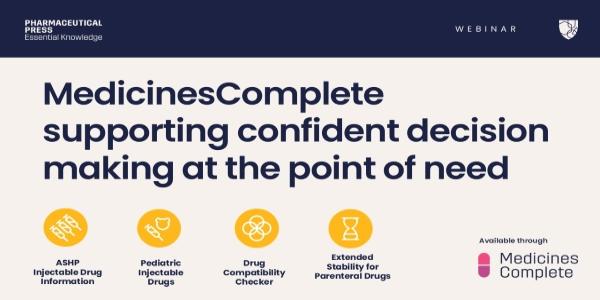|
|
 
|
Leading News
|
An NASP survey highlights ongoing challenges of white bagging, a controversial drug distribution model in which payers mandate that specialty medications be shipped directly to providers. Although payers say white bagging lowers costs, pharmacies, providers and patients describe confusion, wasted drugs and delayed care, while stakeholders call for clearer guidance and greater transparency to protect patient access and safety.
|
|
|

|
Our webinar shows healthcare professionals how to access trusted, evidence-based medicines information to support confident decision-making at the point of need.
Register now to watch our webinar.
|
|
|
|
|
|
 
|
Specialty Pharmacy Update
|
In 2025, McKesson's Health Mart Atlas remains the largest pharmacy services administrative organization, serving over 6,100 pharmacy locations, followed by Cardinal Health's LeaderNet with nearly 5,900 locations and Cencora's Elevate Provider Network with over 5,100 members. This consolidation gives wholesalers control over networks of nearly 25,000 pharmacies and "shows just how vertically integrated -- and powerful -- these intermediaries have become in shaping the future of U.S. pharmacy," writes Adam Fein, president of Drug Channels Institute.
|
|
|
At a recent roundtable, pharmacy leaders and policy experts debated the Trump administration's revived most favored nation drug pricing policy, which would cap US prices at the lowest levels paid in peer countries. Proponents say the policy could lower costs, but experts expressed uncertainty about the policy's implementation and its effects on R&D, market distribution and patient access, and stressed that reforms should simplify care and cut patient expenses.
|
|
|
New federal rules are making it harder for some Americans to get updated COVID-19 vaccines, as pharmacies turn patients away and hurdles such as supply delays, potential insurance gaps and unclear CDC guidance create widespread confusion. Medical groups say COVID-19 vaccines should be available to everyone because they reduce hospitalization and death, while families with vulnerable relatives and young children say the restrictions leave them frustrated and fearful of spreading the virus.
|
|
 |
|
Several states, including Virginia, New Jersey, Pennsylvania, and Connecticut, have issued orders to enhance access to COVID-19 vaccines amid shifting federal guidance. These measures aim to simplify the vaccination process for residents, ensuring that individuals can receive vaccines without needing a prescription. Particularly, Virginia's new order eases access for eligible citizens, aligning with efforts to maintain public health.
|
 |
|
|
More than half of the 93 community oncology practices in the US responding to a survey have been seriously affected by drug shortages that have in some cases led to the use of less effective or more toxic treatments, treatment delays, medication errors or ethical dilemmas. Researchers identified 23 oncology drugs in short supply, including carboplatin, leucovorin and cisplatin.
|
|
|
A Washington Post-KFF poll found that 1 in 6 parents in the US have skipped or delayed childhood vaccines, often due to fears about side effects and distrust of federal health agencies, with hesitance highest among younger, white, very religious, Republican and homeschooling families. While most parents still support immunization, experts warn that declining confidence, fueled in part by HHS Secretary Robert F. Kennedy Jr.'s vaccine skepticism, could lead to outbreaks of diseases like measles and polio.
|
|
|
 | Building a Scalable Customer 360 in Healthcare
On October 2 at 1 PM EST, discover how to link data across platforms and tackle governance challenges. Learn from Baylor Scott & White's digital and analytics leaders in this webinar to find out how they replaced IBM initiate and built a phased Customer 360 to unify 46M identities across Epic, Snowflake, and JV Systems.
Register Now! |
|---|
| |
|
|
 
|
Legislation & Regulation
|
Efforts to reform the prior authorization process in Medicare Advantage plans remain stalled in Congress despite bipartisan support for the Improving Seniors' Timely Access to Care Act. The bill would establish a process for electronic prior authorization, set standards for attachments and increase transparency. The CMS has introduced regulations to streamline prior authorization, effective January 2026, but the agency is also launching a prior authorization pilot program for conventional Medicare.
|
|
|
 | Secure Your Salesforce Workflows
Join Salesforce and WithSecure on September 25th to learn how WithSecure helps you identify security risks and close security gaps with a native, in-platform solution. In this 45-minute session, you'll uncover typically overlooked security risks using WithSecure's insights, seamlessly close gaps with its in-platform solutions, and equip yourself with crucial tools to secure workflows.
Register now! |
|---|
| |
|
|
 
 
|
Clinical & Research News
|
Glucagon-like peptide-1 drugs for diabetes and weight loss may have potential benefits in oncology, according to Deborah Phippard, chief scientific officer at Precision for Medicine. A study involving 1.6 million patients with type 2 diabetes found a lower risk of certain cancers among those receiving GLP-1 drugs. Early research suggests GLP-1 drugs may help overcome chemotherapy resistance.
| | | | | |
